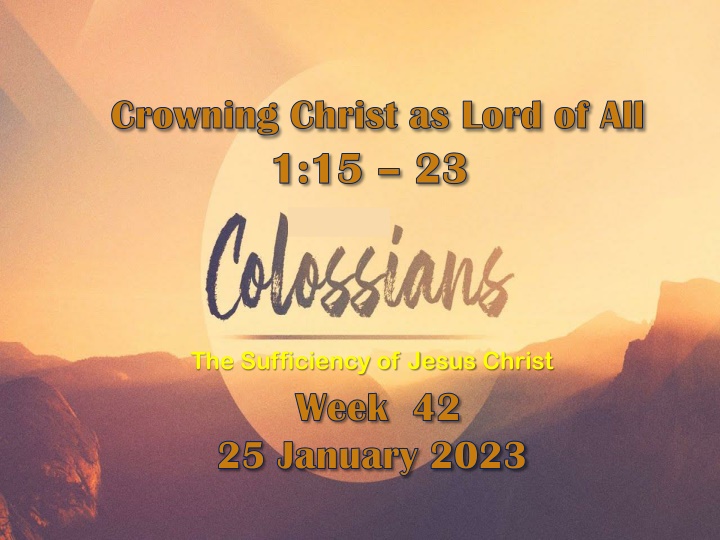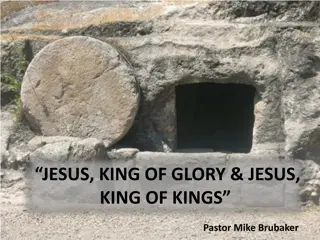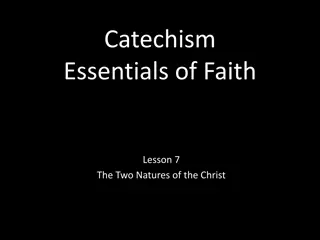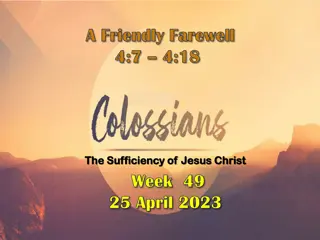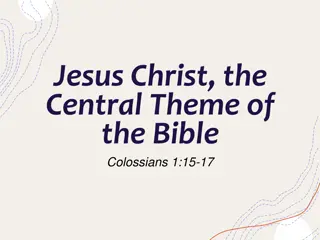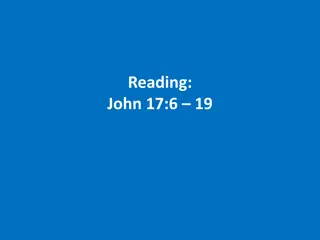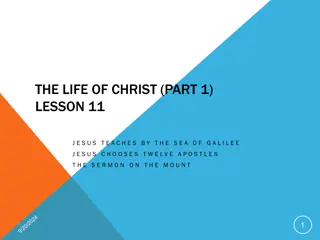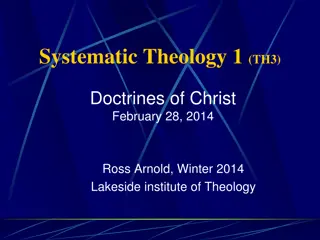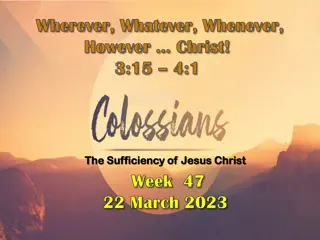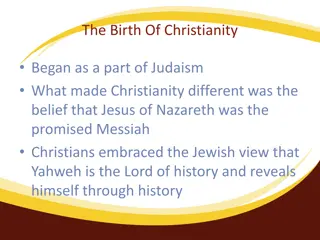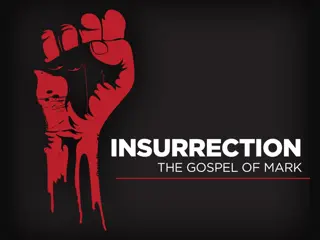Sufficiency of Jesus Christ - Exploring His Lordship
In Colossians, Paul emphasizes Christ's supreme lordship, deity, and humanity. This profound Christology magnifies His reconciling power and preeminence over all creation, inspiring faith and ministry among believers.
Uploaded on Feb 22, 2025 | 0 Views
Download Presentation

Please find below an Image/Link to download the presentation.
The content on the website is provided AS IS for your information and personal use only. It may not be sold, licensed, or shared on other websites without obtaining consent from the author.If you encounter any issues during the download, it is possible that the publisher has removed the file from their server.
You are allowed to download the files provided on this website for personal or commercial use, subject to the condition that they are used lawfully. All files are the property of their respective owners.
The content on the website is provided AS IS for your information and personal use only. It may not be sold, licensed, or shared on other websites without obtaining consent from the author.
E N D
Presentation Transcript
Crowning Christ as Lord of All Crowning Christ as Lord of All 1:15 1:15 23 23 The Sufficiency of Jesus Christ Week 42 Week 42 25 January 2023 25 January 2023
Pauls Pattern of Presentation Christ Is Christ Is Preeminent in All Things Preeminent in All Things Supreme Lord Supreme Lord - - Sufficient Savior Sufficient Savior Colossians 1 Colossians 1 Colossians 2 Colossians 2 Colossians 3 Colossians 3 Colossians 4 Colossians 4 Supremacy of Supremacy of Christ Christ Submission to Submission to Christ Christ Doctrinal Doctrinal and Corrective and Corrective Practical Practical and Reassuring and Reassuring What Christ What Christ Did For Us Did For Us What Christ What Christ Does Through Us Does Through Us Christ Christ Our Lord Our Lord Christ Christ Our Life Our Life Christ Christ our Love our Love Christ the Christ the Head of the Body Head of the Body Christ the Lord Christ the Lord of the Universe of the Universe Christ the Christ the Head of the Home Head of the Home Instruction Instruction Warnings Warnings Exhortations Exhortations Reminders Reminders Reconciliation Reconciliation Creation Creation Submission Submission Conversation Conversation His Person His Person and Work and Work His Peace His Peace and Presence and Presence
COLOSSIANS CHAPTER OVERVIEW In Chapter 1:3-8, Paul begins by expressing his deep gratitude for the Colossian believers, and showing his authentic care and concern for them in his prayer. In verses 1:9-14, with a thankful heart, pointing to the will of Jesus Christ our Lord, Paul prays for the indispensable spiritual virtues of knowledge, wisdom, and understanding. In verses 1:15-20, in what may have been and early hymn, Paul expresses one of the most profound and powerful articulations of the deity and humanity of Christ (Christology) and His absolute lordship over all things.
COLOSSIANS CHAPTER OVERVIEW In these verses Paul reminds us that Christ alone is preeminent over everything. That Christ is fully human and fully divine, and that He is the Source of and Ruler over all creation, and the One who reconciles both heaven and earth. Lastly, in verses 1:21-29, Paul uses this magnificent Christ hymn to encourage and challenge the Colossians to continue in their faith in Jesus as Lord, explaining that authentic ministry derives from their faith and from the hope they received from the proclamation of the gospel.
COLOSSIANS LESSON OVERVIEW Crowning Christ As Lord of All! As we turn our attention to Colossians 1:15-20, we find one of the earliest distinctly Christian hymns written in praise of Christ. Like The Diadem, its purpose was to hail the power of Jesus name and to crown Him Lord of all. Packed with deep reverence for Christ and profound theological truth, the hymn focuses on Jesus unique person and work, underscoring the absolute sufficiency of Christ as Lord. It is one of the single greatest statements in all of scripture regarding the authority, supremacy, headship, and sufficiency of Jesus Christ. For a church struggling with forms of false teachings that were shifting attention from the central truths of the Gospel of Christ toward mythical, mystical, and mysterious speculations, Paul used this memorable hymn to refocus all eyes on Jesus.
COLOSSIANS 1:15 - 20 15He is the image of the invisible God, the firstborn over all creation. 16For by Him all things were created that are in heaven and that are on earth, visible and invisible, whether thrones, dominions, principalities, or powers. All things were created through Him and for Him. 17And He is before all things, and in Him, all things consist. 18And He is the head of the body, the church, who is the beginning, the firstborn from the dead, that in all things He may have the preeminence. 19For it pleased the Father that in Him all the fullness should dwell,20and by Him to reconcile all things to Himself, by Him, whether things on earth or things in heaven, having made peace through the blood of His cross.
COLOSSIANS 1:15 - 20 Swindoll draws our attention to how often, in verses 15-20, Paul used the pronouns He, Him and Himself to emphasize that Christ is the center and the source of everything. In this hymn Paul highlights sixrealms in which Christ is absolutely supreme: Christ is supreme in eternity (1:15, 17). Christ is supreme in creation (1:15-17). Christ is supreme in the church (1:18). Christ is supreme in resurrection (1:18). Christ is supreme in redemption (1:19-20). Christ is supreme in everything (1:18).
COLOSSIANS 1:15 - 20 First Christ is supreme in eternity (1:15, 17) Here Paul establishes Christ s eternal relationship with the Father, affirming that God the Son is the image of the invisible God (1:15). God, who is by nature utterly transcendent and unable to be looked at by finite morals, has made known His attributes, character, power, will and works through His Son. Hebrews 1:3 says it like this: He is the radiance of His glory and the exact representation of His nature. (NASB) In this passage the word translated exact representation is a term used in reference to an engraved character or impress made by a die or seal, like the minted impression on coins.
COLOSSIANS 1:15 - 20 The corresponding term image used here doesn t mean that Christ is a lessor being, but that He is equal to the Father. Paul s point is to truly know God the Father, we must focus attention on God the Son, through whom the transcendent Godhead has been revealed. Christ is also before all things (1:17). Before planets, before galaxies, before matter and energy, before space and time as far back as our finite minds can hope to imagine God the Son was already there. Theologians call this the co-eternality of the Son with the Father. The Holy Spirit is also co-eternal with the Father and Son. Never was the eternal Father without His eternal Son and eternal Spirit. All things visible and invisible originate from the Father, through the Son, and by the Holy Spirit. Christ is supreme in eternity!
COLOSSIANS 1:15 - 20 Second Christ is supreme in creation (1:15-17) Not only is Christ the image of the invisible God but he is supreme over all creation (1:15, NLT). Some translations render this phrase firstborn of all creation (1:15, NASB), which has sometimes been misinterpreted to mean that Christ is the first being created by God. The context here, however, helps us understand the Son as the firstborn heir over all creation. Thus, Christ is the firstborn over all creation in the same sense in which King David was God s firstborn, the highest of the kings of the earth (Ps. 89:27). Firstborn as used here emphasizes Christ s place as supreme authority over creation, not the first creature within creation.
COLOSSIANS 1:15 - 20 This understanding of firstborn as supreme over all creation is confirmed by the logic of the following verse. Here Paul explains, for by Him all things were created (1:16). If firstborn in 1:15 meant first created, it would make no logical sense to say that the reason He is the first created is because all things were created by Him. However, if firstborn means supreme authority, then Paul s logic holds: Christ is supreme over all things because by Him all things were created. By all things Paul really means all things. To avoid any confusion, Paul notes this includes things in heaven and on earth, things visible and invisible, thrones or dominions, or rulers or authorities.
COLOSSIANS 1:15 - 20 In shortnothing from subatomic particles to massive galaxies exists apart from His creative power. For this reason, Paul was able to sum up this notion by saying all things have been created through Him and for Him (1:16). He then adds, and in Him all things hold together (1:17). The latter statement is true both literally and figuratively. Literally, all things in heaven and earth are held together by Christ supreme authority over all creation. Figuratively, all things hold together as a meaningful whole because of Christ. That is, they find their ultimate meaning and purpose in Him, because all things were created not only by Him and through Him but also for Him.
COLOSSIANS 1:15 - 20 Remember the Gnostics viewed Christ as merely one of many emanations for the supreme God. As the rays of the sun diminish in their potency the farther they get from the source, so Gnosticism s Christ, as an emanation from the Father, would have less power and authority, and would have a derived existence, having come into being later than the Father. Paul dispenses with such philosophical nonsense with just a stroke of his stylus Christ is not a creature, but the Creator. He isn t a mere beam from the light source, but the source itself. He isn t a cog in the universe, but the One who holds it all together and gives it meaning and purpose. Christ is supreme in creation!
COLOSSIANS 1:15 - 20 Third Christ is supreme in the Church (1:18) Having presented a clear picture of Christ s absolute supremacy over time and space (1:15-17), Paul brings the cosmic and abstract down to an area more tangible for his readers. Remember, believers have been rescued from the domain of darkness and transferred into the kingdom of God s beloved Son (1:13). We are no longer subject to sin and the evil forces of the world. We who are in the church are now under one head, Jesus Christ (1:18). Although Paul doesn t elaborate on the image of the body of Christ here, he does so in other writings, especially in letters to the Corinthians and the Ephesians. In Ephesians, the portrayal of the headship of Christ over the body emphasizes not only His sole authority over the church . . .
COLOSSIANS 1:15 - 20 . . . but also the unity of the members with one another (Eph. 1:22-23; 4:15-16; 5:23). The unity of the body of Christ isn t comparable to the unity of a man-made society like a club or organization. Rather, the Holy Spirit baptizes each individual believer into spiritual union with Christ (1Cor. 12:13), joining them all into one spiritual body, united to Christ as the head. Note Christ and Christ alone is the head of the church. Not a pastor or a pope. Not a council or a congregation. Not elders, deacons or bishops. Not an archbishop or a monarch. Though Christ has established undershepherds to carry out his earthly ministry, He is the Chief Shepherd (1 Pet. 5:4). The church must never surrender it s headship to anyone but Christ alone. Christ is supreme in the Church!
COLOSSIANS 1:15 - 20 Fourth Christ is supreme in resurrection (1:18) Paul doesn t mean that Christ was the first one to experience a restoration to bodily life after dying. In the Old Testament, the prophet Elisha prayed to the Lord to restore life to a child who had died (2Kgs. 4:32-37). During His earthly ministry, Jesus also raised the dead as a sign of the coming kingdom (Matt 11:5; Mark 5:35-43; Luke 7:11-17; John 11:41-44). However, in each of these cases, those restored to mortal bodies were again subject to death. Their resurrections were temporary resuscitations. The resurrection of Christ, however, was the first of it s kind. He was raised in a glorious, incorruptible body that could never again suffer death.
COLOSSIANS 1:15 - 20 As such, Christ is the first fruits of those who are asleep (1 Cor. 15:20). Later in 1 Corinthians 15, Paul compares the present body with the future resurrection body, demonstrating the qualitative difference between the two: It is sown a perishable body, it is raised an imperishable body; it is sown in dishonor, it is raised in glory; it is sown in weakness, it is raised in power (1 Cor. 15:42-43) Because Christ s resurrection is superior to death, death has lost its sting (1 Cor. 15:55). Because He is our head, we are united with Him in all things, including the experience of our own glorious resurrections.
COLOSSIANS 1:15 - 20 In Philippians 3:21 Paul says, He will transform the body of our humble state into conformity with the body of His glory, by the exertion of the power that He has even to subject all things to Himself (NASB 1995). This means we shall no longer fear death. If we are in Christ united to Him by the Holy Spirit through faith we have absolute confidence in our own resurrection. Because of the supremacy of Christ in resurrection, we, too, have victory over death. Christ is supreme in resurrection!
COLOSSIANS 1:15 - 20 Fifth Christ is supreme in redemption (1:19 - 20) In these last two verses of the Christ hymn, Paul describes in two statements the person of Christ in relation to His work of redemption. First, the fullness dwells in Christ (1:19). Gnostic teachers speculated about the existence of a great Pleroma or fullness of divinity diffused throughout a pantheon of lessor emanated beings, of which Christ was merely one among many. Paul counters that the entire fullness of divine power and authority all the attributes of God are in Christ. Second, because of who He is fully divine and fully human Christ is able to fully accomplish the reconciliation between heaven and earth.
COLOSSIANS 1:15 - 20 Here Paul shifts from the person of Christ to the work of Christ, from His supremacy over all to His sufficiency for all. Through Christ s atoning work on the cross, He has reconciled all things, whether things on earth or things in heaven (1:20). The Gnostics were wrong in their speculation that only spiritual, invisible, heavenly things could be save. Just as heavenly and earthly things were originally created by Christ (1:16), so also heavenly and earthly things would be reconciled by Christ (1:20). Since the fall of Adam, all of humanity has been in disharmony with God. However, because of Christ s substitutionary death in our place the righteous for the unrighteous we have been reconciled with God (2 Cor. 5:18-21).
COLOSSIANS 1:15 - 20 In our helpless, hopeless state, God took the initiative to make peace through the blood of His cross (1:20). Our whole being body and soul is saved by the work of Christ. Christ is supreme in redemption!
COLOSSIANS 1:15 - 20 Six Christ is supreme in everything (1:18) At the heart of the Christ hymn Paul makes the ultimate statement for Christ s all-supremacy: He Himself will come to have first place in everything. Because of who Christ is and what He has done, we can surrender everything to Him. Over little things and big things, over the past, present and future, and over things seen and unseen Jesus Christ is Lord. He is to have first place in everything. Christ is supreme in everything!
COLOSSIANS 1:21 - 23 21And you, who once were alienated and enemies in your mind by wicked works, yet now He has reconciled22in the body of His flesh through death, to present you holy, and blameless, and above reproach in His sight 23if indeed you continue in the faith, grounded and steadfast, and are not moved away from the hope of the gospel which you heard, which was preached to every creature under heaven, of which I, Paul, became a minister.
COLOSSIANS 1:21 - 23 The resounding chorus of the Christ Hymn reached its climax in 1:20. With the profound lyrics still echoing in the air, Paul picks up the theme of Christ s work of reconciliation and turns it into a personal challenge for his readers. The hymn of Colossians 1:15-20 has spoken generally of all things, (16) the Church, (18) and the dead (18). Now Paul moves from the general to the particular, from the universal to the personal, with one little pronoun: YOU. All of us, being sinful by nature and by choice, need reconciliation. It isn t enough to think that Christ has abstractly reconciled heaven and earth through His incarnation, death, and resurrection. The reconciliation must be made personal and practical.
COLOSSIANS 1:21 - 23 The Colossians experienced this when they received reconciliation with God by grace alone through faith alone in Christ alone. They had been alienated and hostile toward God, which manifested in wicked works (1:21). Paul didn t have to make a list of their sins; they knew the evil deeds from which they had been saved. But when the reconciliation Christ accomplished became theirs through His sacrificial death for them, their transformation from sinful to holy had begun. The purpose of their salvation was not only forgiveness of sins (1:14), but also a life that is holy and blameless and beyond reproach (1:22). Whatever the specific danger threatening some among the Colossian church, Paul saw the need to add a sobering warning to this positive statement.
COLOSSIANS 1:21 - 23 He says that they were reconciled to God if indeed they would continue in the faith and hope of the gospel (1:23). At first glance, this conditional phrase seems to suggest that if they failed to continue steadfastly in faith and hope, then they would lose their salvation and forfeit their reconciliation with God, once again becoming alienated and hostile toward the one who had redeemed them. Does this mean that our salvation is ultimately based on our own faithfulness? It is true that an if phase can sometimes indicate a conditional relationship. However an if phrase can also be used to demonstrate the genuineness of something. This is how Paul is using the if phase here. He is saying that if the Colossians persevere in their original faith and hope, it will prove that they are truly members of the body of Christ.
COLOSSIANS 1:21 - 23 Of course Paul knew that not all those who claimed to experience conversion by faith in Christ were the real deal. And the report that some of the Colossian converts had been abandoning the true faith for false, Gnostic teachings would have given him reason for concern. Perhaps the true gospel of the supreme person and work of Christ hadn t been properly understood. Perhaps the clarity and simplicity of the gospel preached by Epaphras was being corrupted by fanciful myths and speculations by Gnostic know-it-alls. Whatever the specific threat, Paul set the record straight with the Christ hymn in 1:15-20 and a personal application in 1:21-23. Showing clearly that Jesus Christ was sufficient as their supreme Lord.
APPLICATIONS OF THE LESSON Crowning Christ as Lord of All
COLOSSIANS APPLICATION After proclaiming the absolute superiority of Christ over everything (1:15-20), Paul places a burden on his readers to continue in the faith firmly established and steadfast, and not be moved away from the hope of the gospel (1:23). As Jude 1:24, reminds us God is ultimately responsible for preserving us, Him who is able to keep you from falling, and to present you faultless before the presence of his glory with exceeding joy. He also called us to faithfulness and perseverance in order that we might receive the abundant blessings of the Christian life. While both aspects of perseverance are needed, we rest in the security of our salvation by grace through faith.
COLOSSIANS APPLICATION We take responsibility to walk with integrity before God by the power of the Spirit, knowing that God is working His power in and through us. Paul s message here in Colossians 1:15-23, gives us some practical instruction believers should adhere to if they want to continue steadfastly in faith and hope. First make Christ first in everything. Think of how it would completely revolutionize our lives if we began each day with the words Christ is supreme over . . . not I m worried about . . . If the significance of this reality isn t sinking in, consider these specific examples of the everything over which Christ is to take first place:
COLOSSIANS APPLICATION Our plans and decisions Our word and actions Our thoughts and emotions Our food and drink Our homes and families Our careers and pastimes Our churches and ministries Our schedules and disruptions Our priorities and passions Our hardships and struggles Our victories and successes
COLOSSIANS APPLICATION Second refocus your attention on Christ. Note at the center of the Christ hymn (1:15-20) is not us, but Him. It isn t God s creatures, but the Creator. It isn t salvation but the Savior. Christ and Christ alone should be the focus of our attention in worship. Verses 21-23, emphasize the faith and the hope of the gospel. Not a general faith or a subjective trust in ourselves, but the faith the truth about the person and work of Jesus Christ. Jude 1:3 says it is the faith which was once for all handed down to the saints. Not vague hope, blind optimism, or wishful thinking, but the hope the promise of salvation through the person and work of Christ. Christ and Christ alone must be the focus of our attention.
COLOSSIANS APPLICATION It s easy for us to become inwardly focused, concerned about our own want, needs, and desires! And how often we become distracted by things around us that attract our attention and command our allegiance! Even in our churches we can buy into ministry models that focus on pastors, musicians, programs or productions that draw attention to themselves rather than point to the faith and hope of Jesus Christ. But, when we make Christ first in everything and refocus our attention on Him, we can stand firm in the faith and be presented holy, blameless and beyond reproach before Him (1:22).
NEXT CLASS 01 Feb 2023 Before next class, read the below chapters in Before next class, read the below chapters in the KJV and in one other versions of the Bible, the KJV and in one other versions of the Bible, i.e., NKJV, NRSV, NIV, CEV, etc i.e., NKJV, NRSV, NIV, CEV, etc Chapter 1:24 1:29 A Precise Explanation of Ministry
